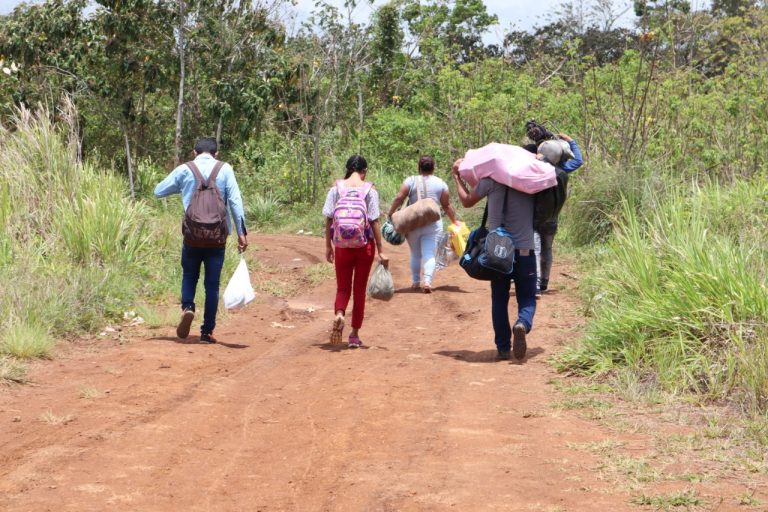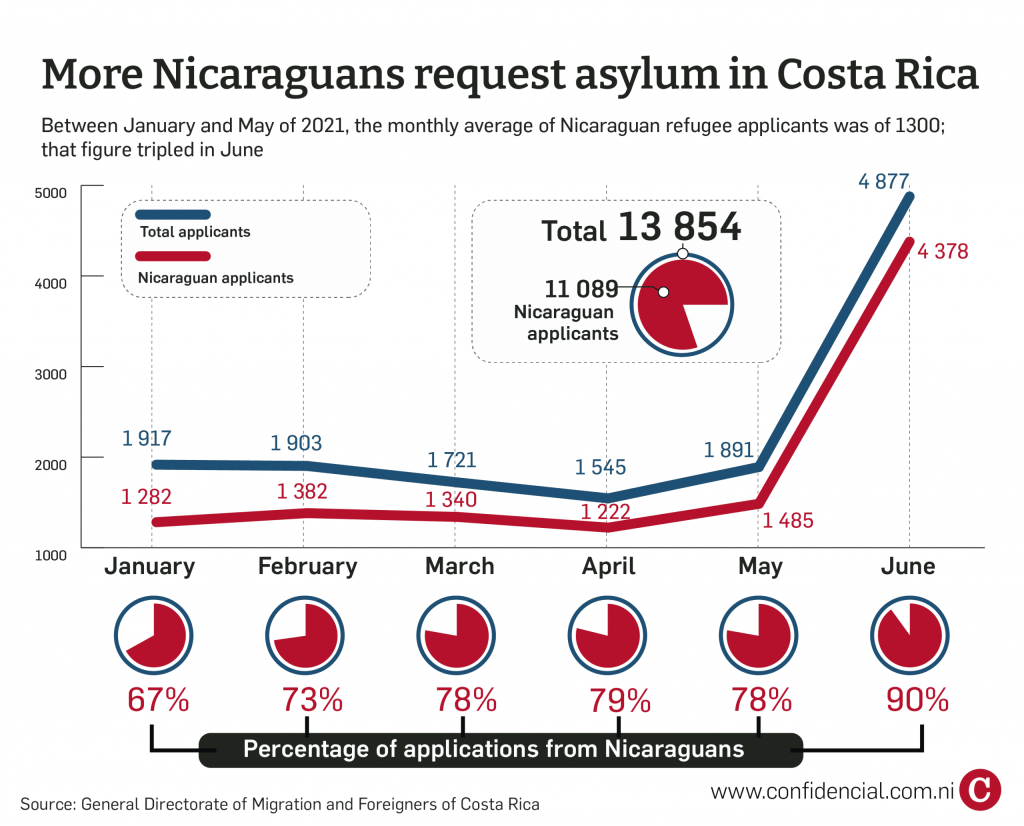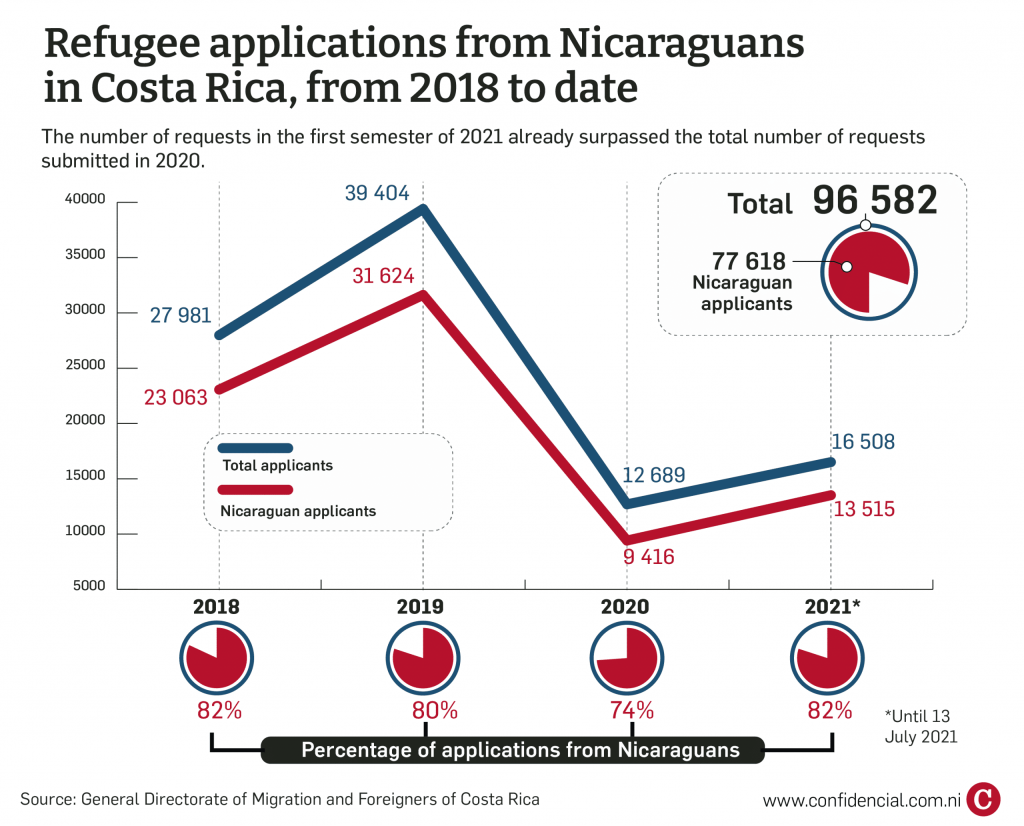20 de julio 2021

Children of Exile: The Births “Sowing Hope” in the Camp of Nicaraguan Farmers

PUBLICIDAD 1M
PUBLICIDAD 4D
PUBLICIDAD 5D
Between January and last May, the monthly average of refuge requests from Nicaraguans was 1300; in June alone that figure rose to 4378

Photo: Nicaragua Actual
Youth leader Yarithza Mairena never considered going into exile. Despite the danger she faced when she got involved in the protests against the government in 2018, leaving Nicaragua was not an option — not even when she was imprisoned by the Ortega regime for six months, between 2018 and 2019 — nor when she experienced a constant police siege. However, on July 1st, she had to leave for Costa Rica to protect her freedom.
The released political prisoner has fully dedicated herself to human rights activism through the Union of Nicaraguan Political Prisoners (UPPN), which she formed with dozens of former political prisoners. “Through the UPPN, we were carrying out a process of building memory and justice, compiling testimonies, and organizational strengthening. This caught the attention of police agents. One came to my mother's house to verbally tell her that I had to report to Police Station 7,” she says.
Since her release from prison in March 2019, Mairena has had to move house seven times due to police and paramilitary sieges. She had no choice but to leave, especially as state repression intensified in June, when the regime imprisoned 26 opponents just five months before the presidential election.

Mairena is one of the 13,515 Nicaraguans who, during 2021, have requested asylum in the offices of the General Directorate of Migration and Foreigners of Costa Rica, according to data collected until last Tuesday, July 13.
According to official figures, the number of Nicaraguan applications tripled in June. Between January and last May, there were an average of 1300 applications per month, in June alone there were 4378.
This increase in applications coincides with the increase in state repression in Nicaragua in recent weeks to which Mairena refers. In addition to this is the social and economic uncertainty four months before an election without minimum democratic conditions.
Carmen Castro, originally from Jinotega, left in September 2020 and requested refuge in Costa Rica. She was joined by her eldest daughter and her husband in June of this year. All three left the country out of fear and because of the economic situation. “Even if you don't want to get involved, they force you to get involved,” says the Nicaraguan, referring to pressure from government sympathizers.
She recalls how her father disappeared during the civil war of the 1980s and blames “sandinismo”. Now, she says, she fears that the same thing will happen and people from her community will disappear. “That they make you disappear as they do with people in the cities, they throw them in jail and do bad things to them, that is what people are afraid of”.
Another Nicaraguan woman who preferred not to be named for security reasons and who also sought refuge in Costa Rica in June, agrees. Although neither she nor her family were directly involved in politics, the atmosphere became hostile where she lived and neighbors distrusted each other after the 2018 protests.
“The socioeconomic situation is going from bad to worse and there is uncertainty with the November election, it makes us think that something might happen,” adds the asylum seeker.
Castro is also not hopeful that the situation will improve during or after next November's elections. She believes that the Ortega regime will remain in power, which is why she will not return soon.
“If it were a good government, we wouldn't be roaming around here in Costa Rica, but one goes out of necessity,” she adds.
Wendy Flores, coordinator of the Human Rights Collective Nicaragua Never Again Impunity which was established in Costa Rica, confirms this increase in the flow of Nicaraguans arriving in Costa Rica.
She explains that this increase is due to mixed reasons: the economic situation of the country, the high instability prior to the general election in November, the danger to which human rights defenders, criminal lawyers, activists, released prisoners, relatives of those murdered, victims, university students, and businessmen are exposed.

“Repression is at all levels and sends a message to the rest of the population that they must be silent”, says the human rights defender.
“We are receiving complaints from people who are arriving, we are also documenting the reasons why they left Nicaragua. People have come who were threatened and harassed, such as former political prisoners, but mainly journalists who were summoned by the Public Prosecutor's Office”, she indicates.
Dozens of journalists have been intimidated when they were summoned as part of the alleged investigations into the now defunct Violeta Barrios de Chamorro Foundation, dedicated to the defense of freedom of the press.
The Prosecutor's Office, controlled by the Ortega Murillo regime, accuses the Foundation and its former president, Cristiana Chamorro, of money laundering. Chamorro, also a presidential candidate, has been under house arrest for more than 40 days and is part of a list of 26 people arrested in recent weeks, which includes other presidential candidates, opposition political leaders, businessmen and journalists.
The Collective accompanies eight journalists in their refugee application process, but is aware of the existence of more cases that have not yet submitted their request, so it believes that the increase in applications could continue in July.
Maricela Hinkelammert, in charge of advocacy at the Center for the Social Rights of Migrants (Cenderos), comments that throughout 2021 she has seen a constant migratory flow of Nicaraguan rural population, especially in the northern zone of Costa Rica.
“Peasants continue to come from Nueva Guinea, El Almendro… families, couples, women, men between 20 and 40 years old, single women with children, and what they say is that they leave Nicaragua because of persecution, because their families receive threats and harassment from government sympathizers. They are identified as being against the government, then their sympathizers and the police begin to harass them,” she says.
The total number of applications filed by Nicaraguans in 2021 already exceeds the 9416 applications that Nicaraguans filed in all of 2020 in Costa Rica, a year marked by the pandemic and the closing of the Costa Rican borders.
From 2018 until last Tuesday, 77 818 Nicaraguans have formalized their request at the Refuge Unit. That number represents 80% of a total of 96 582 petitions to be processed by the Costa Rican institution.
Yaritzha Mairena is already following up on her application for refugee status. She knows that she must stay in Costa Rica for a while.
In order to return to Nicaragua, she hopes for “the end of the dictatorship, or at least for there to be a correlation of forces that will allow us to organize ourselves, because we cannot even organize ourselves as victims under the current circumstances”.
Mairena reports that other UPPN political prisoners have also left the country and others are planning to do the same. Many felt fear when they saw the recapture of former political prisoners in the last month, such as the case of journalist and presidential hopeful Miguel Mora and the leaders of the Peasant Movement Medardo Mairena, Freddy Navas and Pedro Mena, who had been released from prison in 2019, but were detained again in the last few weeks.
“For me, experiencing this situation is unbelievable, I never considered exile. It was less than a month ago that I resigned to the idea that I had to live in another country to survive and heal a little bit from everything I have lived through, and rest, sleep without fear of the Police arriving at any moment, without fear of going out on the street… it is a great emotional and physical deterioration”, she laments.
This article was originally published in Spanish in Confidencial and translated by our staff
Archivado como:
PUBLICIDAD 3M
Periodista nicaragüense desde 2007, con experiencia en prensa escrita, televisión y medios digitales. Tiene una especialización en producción audiovisual y una maestría en Medios de Comunicación, Estudios de Paz y Conflicto de la Universidad para la Paz de las Naciones Unidas. Fundadora y editora de Nicas Migrantes, proyecto por el cual ganó el Impact Award 2022 del Departamento de Estado de EE. UU. Ha realizado coberturas in situ en Los Ángeles (Estados Unidos), México, El Salvador, Guatemala, Nicaragua y Costa Rica. También ha colaborado con France 24, The Guardian, Al Jazeera, BBC World Service. Ha sido finalista y ganadora de varios premios nacionales e internacionales, entre ellos el Premio Latinoamericano de Periodismo de Investigación Javier Valdez, del Instituto Prensa y Sociedad (IPYS), 2022.
PUBLICIDAD 3D